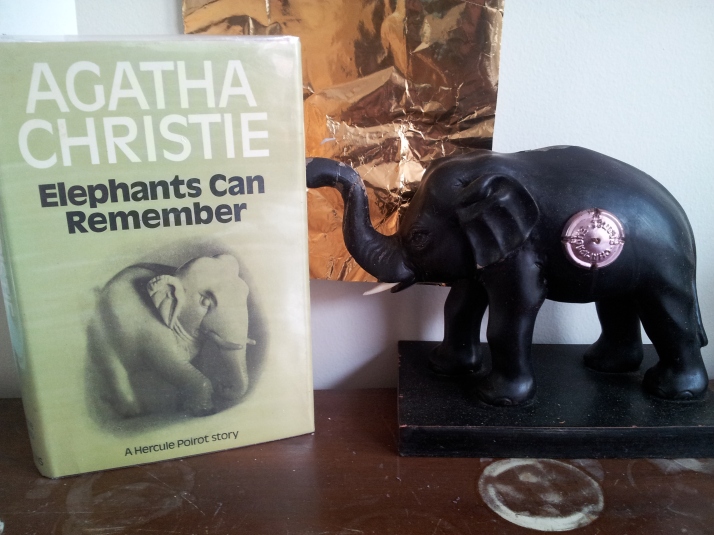I bought the black enameled elephant at Community Thrift for $7.50 some years back. How many? Does the elephant remember?
The elephant’s belly is shiny glossy, but I never see his belly. The rest of her is matte black, due to cleanings with perhaps inappropriate solvents. She’s missing a tusk and her trunk has been glued in two places. Where the enamel’s chipped a dark hardwood shows through.
I nailed the metal cap of a bottle of pink champagne onto his side in a moment of… grandiosity? nostalgia? thirst for significance? The word CHAMPAGNE arcs above the word FRANCE in embossed letters on a rusting pink tin cap. Maybe I was still high when I nailed it to her hide. The nail’s also rusted.
It was love at first sight. I barely hesitated, though it represented a large outlay for an apparently useless objet but I felt the elephant would be of spiritual succor in a time of existential dizziness. His solidity, stolidity, his blackness and brokenness. He stood his ground and reminded me of the black enamel bird so illusory and lusted-after in Dashiell Hammet’s Maltese Falcon.
I’ve moved a lot since I got him and let go of a lot along the way but I’m happy to say I hung onto him.
Today he meets his literary counterpart, Agatha Christie’s Elephants Can Remember, one of the despised late Christies, penned when she was maybe 81. Extraordinary. And yes, the front half of the book, really into the halfway mark, is a mass of sometimes garbled chit-chat not entirely unlike what you get in a Beckett novel. That sense of oh god, here we go again, must we? Only milder, fluffier, woolier, less hellbent. But fundamentally the same subject: why? why not? what? who said that? did someone say that? you expect me to remember?
Except of course with Christie it’s always a dialogue. And around the halfway point she returns to her legendary senses and starts pounding out the requisite who-dunnit. Reader, it picks up speed, gains in coherence, ceases to skirt the fringes of existential malingering.
Elephant is Christie’s chosen totem for a journey back into the personal pasts of people dead by misadventure whose mystery haunts the present and troubles the future of a cute young couple. Christie often offers us a cute young couple, as did Shakespeare in his comedies, an alchemical pair to buoy our spirits as we leave the magic realm at play or book’s end. An amenable future, she offers us. Unlike Beckett, who’s always more of the same, incrementally worse.
“‘It’s a terrible story,’ said Mrs Oliver, ‘terrible. And all those people I talked to — yes, I can see now, they all remembered something. Something that was useful in showing us what the truth was, although it was difficult to put together. [In other words, Reader, all that vagueness in the first 125 pages was a necessary prologue, all that mumbling and bumbling, crucial foreplay to a thrilling climax.]
“‘Except for Monsieur Poirot, who can always put things together out of the most extrordinary things. Like wigs and twins.'”
Wigs and twins. How much of the Christie oeuvre reduces to the exploits of persons twinned biologically or metaphysically, one of whom dons a wig to pass as the other while committing murder?
My question for Christie is this, Do you really believe the metaphysical or psychological theory expounded in the last ten pages? Or did you merely, at age 81, grab a stock plot — the doppelgänger, the evil twin — because you knew it would stick?
My thoughts went first to Olivia de Havilland in Dark Mirror (1946). Thence to nineteenth-century Poe and Hoffmann. But of course it’s older than that. I hate to drag in the bible, but actually the old testament is pretty good on murder and mayhem. (The new testament not so much.) One person, say Cain, can be born evil while his brother Abel can be a great guy, and eventually Cain will kill Abel.
Such a pessimistic view of family values. Such useful information.


From the NYT review
By BOSLEY CROWTHER
Published: October 19, 1946
Like many another actress—Bette Davis, for instance—who has been tempted by the lure of playing against herself, Miss de Havilland does nothing in “The Dark Mirror” that will add to her stature as an actress. Although few actresses have ever achieved distinction in this hazardous undertaking, the dual personality temptation likely will persist until some mischievous author comes along and writes about identical triplets.
Ah, “stature” and “distinction” — words no longer applied to the work of any actor.
I forgot, while blogging, the rivalry between Olivia and her sister Joan Fontaine must’ve made Dark Mirror a real treat for fans, and possibly for Joan! Except fans like Bosley, who liked his screen ladies to behave themselves and be noble. No fun in that!